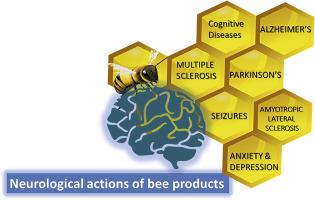Trends in Food Science & Technology ( IF 15.1 ) Pub Date : 2020-05-01 , DOI: 10.1016/j.tifs.2020.04.026 Hesham R. El-Seedi , Shaden A.M. Khalifa , Aida Abd El-Wahed , Ruichang Gao , Zhiming Guo , Haroon Elrasheid Tahir , Chao Zhao , Ming Du , Mohamed A. Farag , Syed G. Musharraf , Ghulam Abbas

|
Background
According to the World Health Organization, two billion people will attain the age of 60 years or more by 2050. Ageing is a major risk factor for a number of neurodegenerative disorders, which currently possess challenge to the global health status, carrying economic and social consequences. Therefore, attention has been dedicated towards the development of neuroprotective agents derived from natural sources. Honeybee products, such as honey, bee pollen, bee bread, propolis, royal jelly, beeswax, and bee venom have been used for therapeutic purposes since ancient times in Egypt, Greece, and China. Despite the emergence of modern medicine, bee products remain clinically relevant owing to their potential as anti-inflammatory, anti-oxidant, and neuroprotective agents.
Scope and approach
This review demonstrates the potential of bee products against neurological disorders in the light of the current literature.
Key findings and conclusions
Bee products and individual isolated components have enormous therapeutic potential for multiple neurological disorders. The different studies show overall neuroprotective and nerve-tonic characteristics of bee products, mainly due to their anti-oxidant, anti-inflammatory and anti-apoptotic features. However, some limitations such as allergic reactions and the cytotoxic effect of some bee products warrant a special care in its development as drug leads in future studies.











































 京公网安备 11010802027423号
京公网安备 11010802027423号